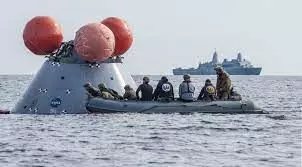
Artemis' Orion returns safely to Earth, Mission success
text_fieldsAfter completing a near 26-day mission, Artemis 1's capsule Orion has returned to Earth safely and splashed down in the Pacific Ocean. Mike Sarafin, the Artemis project manager, said this is what mission success looks like.
It has completed Artemis 1's flight test. "Splashdown is the final milestone of the Artemis I mission that began with a successful liftoff of NASA's Space Launch System (SLS) rocket on Nov. 16, from Launch Pad 39B at NASA's Kennedy Space Center in Florida. Over 25.5 days, NASA tested Orion in the harsh environment of deep space before flying astronauts on Artemis II," wrote NASA.
NASA's Orion space capsule will be part of the next Artemis mission as well. The complex mission will carry humans most likely in 2025 or 2026. The safe return of the capsule has undoubtedly proven the newly designed protective layer on the underside of the capsule. It will ensure the safety of astronauts on future missions.
Speaking about the next mission, NASA administrator Bill Nelson said: "This time we go back to the Moon to learn to live, to work, to invent, to create, in order to go on out into the cosmos to further explore. The plan is to get ready to go with humans to Mars late in the decade of the 2030s, and then even further beyond."
"More than 50 years ago, NASA - the American space agency - did the impossible by making it possible. They landed humans on the Moon. Now, five decades later, NASA is doing that again, but for a different purpose," he added.
"The splashdown of the Orion spacecraft – which occurred 50 years to the day of the Apollo 17 Moon landing – is the crowning achievement of Artemis I. From the launch of the world's most powerful rocket to the exceptional journey around the Moon and back to Earth, this flight test is a major step forward in the Artemis Generation of lunar exploration," stated Nelson.
The capsule will now undergo an official inspection to find out whether the heatshield worked. As of now, it looks like the design was able to do its protective duty during the intense re-entry to Earth's atmosphere.
Jim Free, the NASA associate administrator for the Exploration Systems Development Mission Directorate, said now NASA can begin to see the next mission on the horizon which will fly crew to the Moon for the first time as a part of the next era of exploration. "This begins our path to a regular cadence of missions and a sustained human presence at the Moon for scientific discovery and to prepare for human missions to Mars."


















